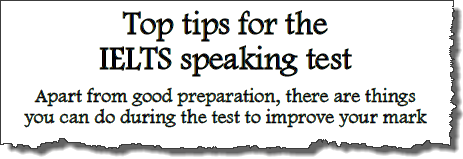SPEAKING TIPS IN IELTS
How To Score High Band In IELTS ?
In IELTS there are four modules. Listening, Reading, Writing and Speaking. And result is on bands.
IELTS is the biggest fear for most of the candidates,especially speaking part. As a matter of fact, your stress levels at the time of speaking, your overall mental performance, familiarity with the topic you’re discussing and also frequency of your spoken English practice. However, it is an exam which is very close to your real life and highly interactive in nature.
Speaking test pattern:
It consist of 3 parts. Duration of the test is approximately 11 _ 14 minutes. These min are your show case to produce your good English. Topics 3 (through out the world) and includes almost 12 questions.
Part 1 _ Introductory part. (4_5 min)
Its a very easy part amongst all the 3. Its short and common topics. Its like interview how u introduce your self. Its simple.
Greeting the examiner
1. Good morning / good afternoon
2. What’s your name?
Ans. My name’s ——-
Here better you can name’s other than name is… because ILETS speaking module is conversational type of test. Interact like normal speakers not as in personal interview section. So be relaxed.
3. What can I call you?
Ans. You can call me ____
Just call me ____
Please call me ___
You can start with either of these.
4. Where are you from?
Ans. I’m from ____ which in the east of india
Here “which” is a clause gives u high band score.
5. Can you show me your ID?
Ans. Here you are
Sure here you
Of course here you are
Say any of these…
Possible topics are:
[box type=”info” align=”aligncenter” class=”” width=””]Family Friends Food Flowers Hobbies Happiness News paper School Clothes Sports Weather Day out Childhood Transport Computer or technology Shopping Animal Drink Book Tv or tv programme[/box]For eg. if the examiner asks which is your favourite book?
You have to develop your answer,but short; which, what, when etc try to answer from your experience, so it feel as real. Don’t memorise the answer it will cost your band.
Part 2 _ cue card/topic card (3 to 4 min)
Its some what complex. You have to answer in detail. So develop answers. Read question, it contain about 5 questions. They will provide a paper and pencil ; you can write appropriate clues regarding that question. Usually they ask past conditions. Your childhood incident for example. Try to give answer in past tense. Give full answers by explaining why, what, when, where, whom you are related with. Etc.
Tip_ No need to tell the truth you can make your own situation. Ielts is a vocabulary test its not testing your knowledge or truth behind it. But personal experience help you to give detail answer. Or Imagine you yourself in the particular situation. So you can produce a real world. Speak about 3 _4 min continues until examiner interrupt you.
Part_3 Discussion( 4 to 5 min)
This is more similar to discussion. Examiner ask you questions in between.It may not be a familiar question.Try to give examples in part 3.
If you really not aware about the topic say … ( To be honest, I’ve never really thought about it before. I guess —— but I can’t say)
So here at least you are speaking continues, its not effect a lot in your band.
Here are some IELTS TEST CRACKERS…
1. Find fun in speaking English:
Stop hesitate to speaking English.
2. Use phrases:
English Phrases Will Enable You to Speak so Much More Fluently!
“Well…”, “Right”… in the beginnings will give u sufficient pace to think further. So u can avoid “mm” “uh”…..And that’s how you can begin sentences when you have to buy some time and when you can’t really answer immediately.
3.Immerse yourself in the English language…
Making groups or talking with peer and family members.
4. Vocabulary
A good command over vocabulary will surely become the baseline while preparing for your IELTS.
.read a lot ( news papers,magazines)
.listen a lot (british pod cast, English movies)
.study grammar (simple and complex)
.learn new words( with pronunciation)
5. Fluency
Fluency should not be confused with access. Fluency in the sense your length of answer and flow with out “mm”, “uh” or long silence
Fluency is al about clarity and pronunciation
You should not be too fast or too slow while speaking ,good stress,timing.
6. Grammar
Its depend on your range of tense you can use. Simple to complex tense
7. Pronunciation
Don’t paraphrase the answer. Instead of that you can use synonyms. Non native English uses have common pronunciation errors ; this can be rectified by hearing british council pod cast or google the particular difficult word and use the audio signal to here and repeat the word.
It may not be required extensive amount of exercises done for improving your English basics, but familiarising yourself with most common used words and phrases is the prime factor for preparing for any kind of language aptitude test. As we always get adapted towards new things in life which come across, like ways new words should be learnt. You must do more and more conversation so as to be familiar with words, sentences and situations.
Home work: practice, record your answers on different topic, use every opportunity to speak English.
